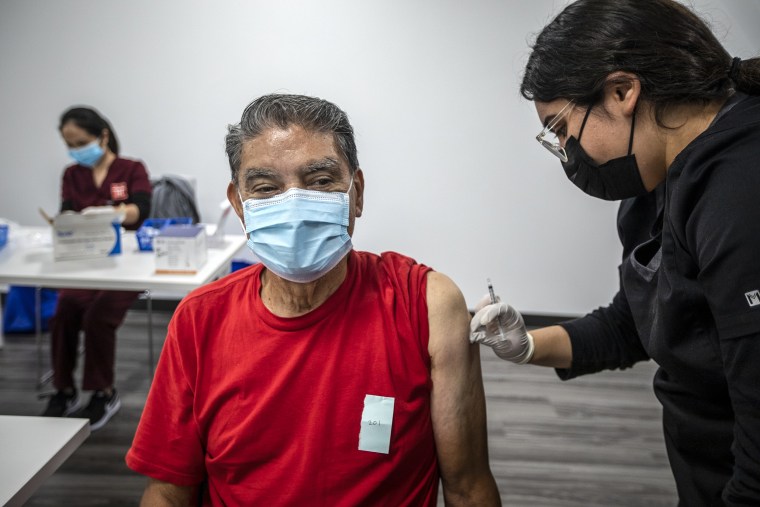Food and Drug Administration advisers will meet Wednesday to hash out what the future of Covid-19 boosters looks like in the United States.
It's a question that looms large: Just a week ago, the FDA and the Centers for Disease Control and Prevention signed off on a second booster dose for people ages 50 and up, four months after their first booster.
Full coverage of the Covid-19 pandemic
But fewer than half of eligible adults have even received that first booster shot, and some health experts question whether getting additional doses of the vaccines every few months to protect against mild illness is a practical public health strategy.
The all-day meeting Wednesday of the agency’s Vaccines and Related Biological Products Advisory Committee will try to answer these questions, or at least develop a framework for a long-term booster strategy, according to briefing documents released by the FDA before the meeting.
The Covid vaccination schedule in the U.S. has so far been determined in real time. When vaccines were first available, it was thought two doses of the Pfizer-BioNTech or the Moderna vaccines, or one dose of the Johnson & Johnson, would be sufficient.
As the pandemic evolved, however, new variants emerged and immunity waned, leading to the need for boosters.
But the U.S. never led the way on boosters, instead looking to other countries, including Israel and the United Kingdom, for data on when to boost.
The hope, experts say, is that by the end of Wednesday's meeting, U.S. regulators will have a clearer picture of how to think about Covid boosters moving forward. The meeting doesn't include a formal vote on recommendations, though the discussion is expected to influence the agency’s thinking on the future of Covid boosters.
FDA scientists anticipate the process for updating and distributing Covid boosters could become like the flu shot, where scientists constantly monitor influenza strains and, each year, select three to four that they think will be circulating widely to include in the flu vaccine.
It’s a “wonderful system,” said Dr. William Schaffner, an infectious diseases expert at the Vanderbilt University Medical Center. “There has been a desire for some time now that we create something similar for Covid.”
If that happens, it might make sense for Pfizer and Moderna to update their vaccines to target two or more circulating strains, like the seasonal flu vaccine, Schaffner said. This year’s flu shot, for example, targets four strains of influenza.
The FDA may need to establish a new process to get those new shots approved quickly, he added. "If you start combination vaccines, the question is, how much data do you need? How do you recruit the participants?"
The U.S. will also need to work with other countries to develop systems that can detect changes in the virus fast enough for the manufacturers to develop new shots, said Bill Hanage, an epidemiologist at the Harvard T.H. Chan School of Public Health.
But what works for monitoring the flu may not work for Covid, Hanage said, noting that the viruses evolve differently.
Usually, the dominant strain of influenza circulating in any given flu season is a descendant from the last flu season.
"We haven't seen that at all with SARS-Cov-2," he said, referring to the virus that causes Covid. "Delta starts transmitting and omicron just stays completely off the grid until October 2021, when suddenly not one but two flavors, BA.1 and BA.2, which are as divergent from each other in terms of spike protein as delta is from original, suddenly start appearing."
There also needs to be a discussion on exactly what kind of protection federal regulators are expecting the boosters to provide, Dr. Celine Gounder, an infectious disease specialist at NYU Langone Health in New York City, said in an email.
Gounder outlined several questions about the goals of future boosters. Will boosting, for example, raise antibody levels for more than three to four months? Will it broaden a person's immunity to protect against more variants? Will it provide greater protection against hospitalization and death, and how long will that last?
In the long run, a vaccine that has longer protection than the shots from Pfizer and Moderna may be needed, said John Moore, a professor of microbiology and immunology at the Weill Cornell Medical College.
Federal regulators may also need to consider the consequences of deploying a Covid shot alongside the flu vaccine, especially when the Covid shot is no longer paid for by the federal government, said Schaffner, of Vanderbilt University Medical Center.
The government may have a hard time persuading people to get the shot because it is asking the public to roll up "two sleeves," instead of one, he said. As a public health strategy, that is "not an easy thing to do."
That's why the idea of a two-in-one vaccine, designed to protect against Covid and the flu, is so popular among the scientific community, he said. Moderna has said it is working on such a vaccine.
Follow NBC HEALTH on Twitter & Facebook.

